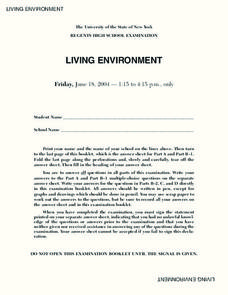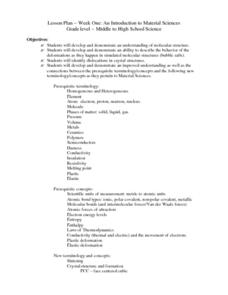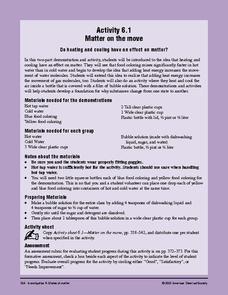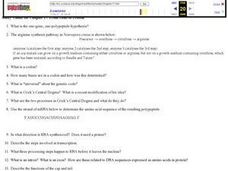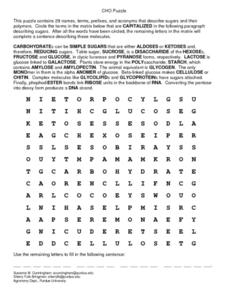Curated OER
Living Environment
For this environmental worksheet young scholars complete a series of multiple choice and short answer questions on cell types, cell division, chromosomes and plant species.
Curated OER
Hot Air Balloons
Young scholars examine how a hot air balloon works. In this hot air balloon instructional activity, students do an experiment to test the effects of heat on density. Young scholars make their own hot air balloon and act out how nitrogen...
Curated OER
Sweet Science: How Sugar Molecules are Manipulated in Candy Making
Students investigate how heat affect sugar solutions. In this science lesson, students compare the sweetness of different types of sugars. They research the development of sugar and create a timeline.
Curated OER
Making a Human Methane Molecule
Students demonstrate the components of methane molecules to discover their effects on the atmosphere. Students role-play as four hydrogen atoms and one carbon atom linked together to make a methane molecule. Students act as the molecule...
Curated OER
An Introduction To Material Sciences
Students investigate the concept of molecular structure. They describe the behavior of simulated molecules and identify any dislocations in crystalline structures. They also define various related vocabulary words and use them in...
Curated OER
Molecular Modeling Activity
Students explore the concept of molecular modeling and differentiate between saturated and unsaturated compounds. In small groups, they identify molecular formulas, complete a chart comparing alkanes, alkenes, and alkynes, and construct...
Curated OER
The Nature of Chemical Change: Acting Out an Example
Students identify the signs that a chemical reaction took place. In this chemistry lesson, students role play the movement of different molecules of matter. They classify matter according to their properties.
Curated OER
VSEPR THEORY: BALLOONS AND MOLECULES
Students listen to the teacher introduce VSEPR theory and explain molecular geometry. They use balloons to visualize the shape of orbitals. Students create visuals of molecular orbitals with strings and balloons.
Curated OER
Controlling the Code: Molecules at Word
Young scholars investigate how cells determine which genes will be expressed and which will be silent. In this genetics lesson, students use on-line resources to complete a worksheet and gather information about gene regulation. Lesson...
American Chemical Society
Heat, Temperature, and Conduction
How does heat move from one item to another, even when the items are in different states of matter? Pupils experiment with adding washers to hot water and adding hot washers to room temperature water to observe the heat transfer.
Curated OER
The Influence of Initiator Concentration on the Molecular Weight of Polystyrene
This in-depth organic chemistry lab walks learners through an investigation of the effect of initiator concentration on the resulting molecular weight of polystyrene. It is important that you use this lesson with experienced chemistry...
American Chemical Society
Temperature Affects Density
Different substances can have different densities, but can the same substance have different densities? Lesson explores the effect of temperature on the density of water. Extension idea connects the concept of how melting ice in lakes...
American Chemical Society
Why Does Water Dissolve Sugar?
Did you know that if you wait long enough, the M on the outside of an M and M will float to the surface when submerged in water? Learners observe the sugar coating of an M and M while it is dissolving in water. They explain how this...
American Chemical Society
Surface Tension
A drop of dew holds a sphere shape even when sitting on a seat thanks to the surface tension of water. Learners observe the phenomena of surface tension in water. Through demonstrations, hands-on activities, and discussions they explore...
American Chemical Society
Matter on the Move
Start this mini unit on matter out by demonstrating how food coloring behaves when placed in cold and in hot water. Then have the class experiment with warm water and soap film. Pupils will learn that an increase in thermal energy also...
American Chemical Society
Can Liquids Dissolve in Water?
How does food coloring work? Classes watch a demonstration showing liquids dissolving in liquids. In groups, they then explore the ability of other liquids to dissolve in water (alcohol, mineral oil, and corn syrup) by setting up and...
American Chemical Society
Density of Water
We know solids have a density we can measure, but what about liquids? Lesson explores this concept and allows scholars to explore the relationship between volume and density. Graphing and analysis questions round out the activity.
University of Georgia
What's So Special about Bottled Drinking Water?
Is artesian water designed to be better, or is it just from wells similar to those in the city of Artesium? This experiment looks at many different types of bottled waters, including artesian. Using a soap mixture, scholars test to see...
Curated OER
From Gene to Protein Study Guide
In this biology worksheet, learners review and answer different questions based upon the molecules of DNA and RNA. They look at the specific protein order of the DNA strand and its synthesis.
Curated OER
CHO Puzzle
In this sugar worksheet, students complete a puzzle by circling all the words in the puzzle related to sugars. The remaining letters in the puzzle create a sentence describing the sugar molecules.
Curated OER
Reactions of Benzene Derivatives
In this reactions of benzene derivatives, students complete 8 reactions of derivatives of benzene and write the organic molecules formed. If no reaction occurs they indicate N.R.
Curated OER
Organic Chemistry II-Exam Answer Key
For this organic chemistry worksheet, students solve 10 multiple choice problems about organic reactions, they write the molecular structures for the products of 20 reactions, they answer 10 short answer questions about specific groups...
Virginia Department of Education
The Hydrologic Cycle
There is the same amount of water on earth now as there was when it was formed. The water from your faucet could contain molecules that dinosaurs drank! Young scientists build their own hydrologic cycle model and observe...
Global Change
The Carbon Cycle and its Role in Climate Change
So how does the carbon cycle work? Kids participate in a hands-on activity that allows them to understand the chemistry behind climate change and global warming. They act out the process of photosynthesis by labeling themselves as...
Other popular searches
- Atoms and Molecules
- Gumdrop Atoms and Molecules
- Atoms & Molecules
- Compounds and Molecules
- Water Molecules
- Organic Molecules
- Atoms Molecules
- Building Molecules
- Molecules of Life
- Gas Molecules
- Matter and Molecules
- Biological Molecules
